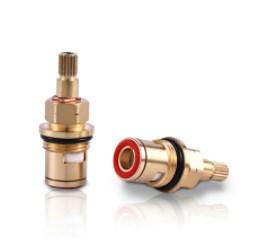Understanding the Role of Ceramic Valve Core's Thermal Expansion Coefficient in Valve Performance Enhancement

The coefficient of thermal expansion (CTE) is a fundamental property of materials that describes the extent to which a material expands or contracts in response to changes in temperature. In the context of valve technology, the CTE of a ceramic valve core plays a pivotal role in determining the overall performance, durability, and reliability of the valve system. This article aims to explore the intricate relationship between the CTE of ceramic valve cores and their impact on valve performance.
Ceramic valve cores are known for their exceptional resistance to wear, corrosion, and high-temperature environments, making them ideal for use in a variety of applications where traditional metallic valve cores may falter. The low CTE of ceramic materials is one of the key factors that contribute to the superior performance of ceramic valve cores. Unlike metals, which tend to expand significantly with temperature increases, ceramics exhibit minimal expansion, leading to a more stable and consistent valve operation.
The stability provided by the low CTE of ceramic valve cores is particularly beneficial in systems that experience frequent temperature fluctuations. In such scenarios, the valve's ability to maintain a tight seal and precise control over fluid flow is critical. The reduced thermal expansion of ceramic valve cores ensures that the valve seats and seals remain in close contact, even as the surrounding temperature changes. This minimizes the risk of leaks and maintains the valve's efficiency, which is essential for processes that require precise control over fluid flow rates.
Moreover, the low CTE of ceramic valve cores also contributes to their longevity. In high-temperature applications, the reduced thermal expansion can help prevent the valve core from becoming deformed or damaged, which can lead to premature failure. This is especially important in industries such as chemical processing, power generation, and oil and gas, where valves are often subjected to extreme temperatures and corrosive environments.
However, it is important to note that while the low CTE of ceramic valve cores offers numerous advantages, it also presents certain challenges. When used in conjunction with materials that have a higher CTE, such as metals, the differential expansion can lead to stress at the interface between the ceramic valve core and the surrounding components. This can result in mechanical failure if not properly managed through careful design and material selection.
To mitigate these challenges, engineers must consider the CTE of all materials in the valve assembly when designing a system. This includes not only the valve core but also the seats, seals, and other components that come into contact with the fluid. By selecting materials with compatible CTEs, the risk of thermal stress and subsequent failure can be minimized.
In conclusion, the coefficient of thermal expansion of ceramic valve cores is a critical factor that significantly influences the performance of valves in various applications. The low CTE of ceramics provides a stable and reliable platform for valve operation, particularly in environments with fluctuating temperatures. However, it is essential to consider the CTE of all materials in the valve assembly to ensure compatibility and prevent thermal stress-related issues. By understanding and leveraging the properties of ceramic valve cores, engineers can design more efficient, reliable, and durable valve systems that meet the demands of today's challenging industrial environments.
- Art
- Causes
- Crafts
- Dance
- Drinks
- Film
- Fitness
- Food
- Spiele
- Gardening
- Health
- Home
- Literature
- Music
- Networking
- Other
- Party
- Religion
- Shopping
- Sports
- Theater
- Wellness


